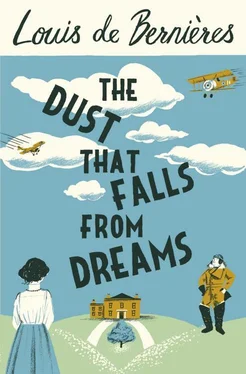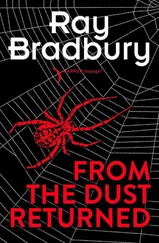A few nights later the air-raid maroon went off, and the immense engines of a Zeppelin were heard overhead. The air filled with the strong, aromatic odour of their kerosene. Mrs McCosh hustled the servants from their top-floor rooms down into the kitchen. Her husband announced his intention to die comfortably in his own bed, and refused to leave it.
Mrs McCosh found her air rifle and her tin of pellets, and went out onto the terrace that had been a conservatory before its conversion by a bomb. She beheld the airship above, caught in searchlights. It was quite inconceivably vast, and seemed to fill the whole sky from one side to the other. She stood still for a minute, awestruck. It was outrageous that this leviathan could come so far and rain bombs on the innocent, but, equally, it was a very beautiful sight, majestic, effulgent in the cross lights. The night fighters were up, their engines buzzing and clattering in harmony with the roar of the Zeppelin. Because the night fighters had arrived, the anti-aircraft batteries fell silent.
Mrs McCosh loaded her air rifle and shot at the Zeppelin. She knew that the pellets would fall thousands of feet short, and wished she had a real weapon, but she shot at the airship because this was the best she could do for Myrtle Cowburn, the best she could do to assuage her unassuageable hatred and indignation. When the airship had sailed sedately away and the bugle was blown for the all-clear, she went to the kitchen and told the servants to return to their beds.
In the morning she read that the Zeppelin had been shot down in flames near Enfield, and in the withdrawing room she danced triumphantly to the inaudible music of joy with her bemused husband, before allowing him to go to work.
On 20th June she attended the funeral of the eighteen little children killed by bombers in Poplar, and sniffled into her handkerchief as the horses drew the flower-laden hearses by. She left a wreath in the town hall, along with some five hundred others. The stories were known all over the nation; how a father was able to identify his five-year-old daughter only by the Egyptian medal round her neck; how an engineer identified his headless daughter in the mortuary by means of a freshly sewn-on button; how of one child, nothing remained except her boots.
There was no room in the church, so she did not hear the bishop read out the King’s message. The bishop said that after two thousand years of Christianity, it was inconceivable that war was now being waged against women and children. Mrs McCosh followed the hearses to East London Cemetery, and watched as the strong young sailors carried the tiny coffins to their communal grave. Then she went home and shut herself in her room, devastated all over again by what had happened to Myrtle.
The next day Mrs McCosh went to Charing Cross Station and joined the sympathetic crowds who gathered there in order to welcome in the wounded. This she continued to do almost every day until the end of the war. She needed to have something to do, now that her daughters had left home, and there were so many horrible images and sounds that cluttered up and confused her mind.
47. Daniel Pitt to his Mother (3)
No fixed address
6 April 1918
Ma chère maman,
We are, as you know, in the middle of the most hideous German push. I like to think it’s their last desperate effort, but we’ve had to move airfields twice, and now we’re moving again. I have been sleeping in a leaky tent with a waterproof blanket that isn’t.
But, chère maman ! Light in the darkness! I have had the immense good luck to shoot down a Gotha! The Gothas come over quite often, but normally they are too high for us to reach them. This one was flying over the airfield quite low (11,000 ft) when I was coming back from an OP on my own, because the other two in my flight had developed dud engines and gone home early, and I nearly decided to run and hide in a cloud, because the damned things are impregnable. Discretion is the better part etc.
But I didn’t, and I came down out of the sun, and got the observer in the back before he even saw me, overflew, immelmanned, and got the pilot on the second run. He managed to crash-land in a field and the bus didn’t catch fire, so we got the pilot out and the other two crew, but the pilot died a few hours afterwards. Mimimal blood on my hands, though: it could have been four. The Gotha is vast, but not as big as a Handley Page.
And so … I have joined a tiny elite of Gotha-busting Hun-punchers! I am very fortunate, except that I had spent the previous day with the fitters, zeroing and fine-tuning my guns.
Fluke (my squadron leader) has put me up for an MC, and then he sent off a letter to Paris to tell Pétain that he’d damned well better give me the Croix de Guerre.
I can’t tell you, maman , what a stupendous rag and binge we had in the mess. My head will never be the same again.
Ton fils dévoué et vainqueur,
Daniel P.
ON 11 NOVEMBER 1918 Lloyd George read out the terms of the armistice to the assembled House of Commons, and then the entire House adjourned for a service at St Margaret’s. A copy of the terms was posted at eleven o’clock on the railings of Buckingham Palace, and a great swell of people assembled at the Victoria Memorial.
The factories closed and the workers poured out into the streets. Anyone in uniform was hoisted onto people’s shoulders and jubilantly carried along, seldom in the direction they had been hoping to take. Bonfires blazed and fireworks crackled from Land’s End to Dover to Holyhead to Benbane Head to John o’Groats. Policemen had their helmets whisked off their heads and set on top of lamp posts at humorous angles. Soldiers overturned taxis and set them on fire. The crowds surged and cheered. At exactly eleven o’clock the maroons went off all over the country, and church bells swung vigorously and joyously in their towers. If there were no accordion to dance to, folk stood and clapped out a rhythm as youngsters and oldsters alike capered in the streets. The shop girls in Harrod’s opened the windows, climbed on the roofs, and waved their handkerchiefs and flags above Knightsbridge. A bus drove by bearing a sign ‘To Berlin, only a penny’, its overcrowded passengers singing and whooping.
The King emerged on the balcony in the uniform of an admiral, accompanied by Queen Mary. The guard presented arms, a band played the national anthem, and after half an hour the King returned inside, only to be summoned forth again by an irresistible cry of ‘Good old King George! We want King George! We want King George!’ Someone began ‘Rule Brittannia’, and the whole crowd joined in. They sang the ‘Old Hundred’, and the Marseillaise. Somebody began the chant of ‘Speech! Speech! Speech!’ and the King thereupon made the shortest speech of his life, perfectly aware that nobody could hear it. The crowd sang ‘Now Thank We All Our God’ and afterwards the King joined in with the cheering. The crowd, drunk with relief and happiness, called for the King to re-emerge, and expressed no ill will when he didn’t, until at half past three he and the Queen drove out in an open carriage, accompanied only by four mounted policemen. They passed in a great circle down the Mall, the Strand, Fleet Street, Ludgate Hill, Queen Victoria Street, Holborn, Oxford Street, Shaftesbury Avenue, Trafalgar Square and back down the Mall. It rained but the people would not disperse. When it grew dark the King and Queen came back out on the balcony in a halo of electric light that dazzled the crowd.
In the meantime the Prime Minister had made a speech in Downing Street, and then the people demanded another speech, so he had to come to the window and address them again. The cheers resounded to Westminster. ‘We have won a great victory,’ he declared, ‘and we are entitled to a bit of shouting.’
Читать дальше












